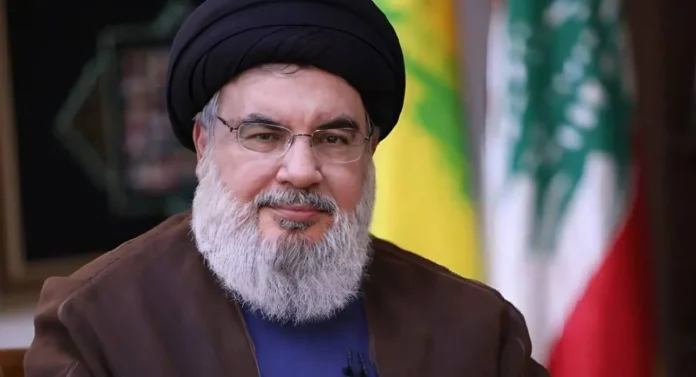Hezbollah has confirmed the death of its leader, Hassan Nasrallah, who was killed in an Israeli airstrike in Beirut on Friday. The announcement marks a huge escalation in the ongoing conflict, which has intensified over the past year, reports an AP report.
In a statement released on Saturday, Hezbollah proclaimed that Nasrallah “has joined his fellow martyrs” and vowed to continue its “holy war” against Israel and in support of Palestine. Nasrallah, who had led the group for over three decades, is the most high-profile target killed in the recent violence.
The Israeli military reported that the airstrike targeted a Hezbollah leadership meeting in the Dahiyeh neighborhood, resulting in the deaths of six individuals, including Ali Karki, the commander of Hezbollah’s Southern Front. The strikes also left 91 people injured and destroyed six apartment buildings, according to the Lebanese Health Ministry.
Lt. Col. Nadav Shoshani, an Israeli army spokesperson, stated that the operation was based on years of intelligence and real-time information, confirming Nasrallah’s death through various intelligence methods.
Israel’s Chief of Staff, Lt. Gen. Herzi Halevi, indicated that Nasrallah’s elimination is just one aspect of their military strategy, hinting at further strikes against Hezbollah. He noted that the operation was a culmination of extensive preparation and reiterated that Israel would continue to exert pressure on Hezbollah until it ceased its attacks.
The conflict has resulted in huge displacement, with over 200,000 Lebanese fleeing their homes in the last week alone. Meanwhile, Israel has mobilized additional reserve soldiers, activating three battalions in anticipation of further escalation. Israeli forces have been striking Hezbollah’s capabilities, including its strategic weapons.
Iran has responded to Nasrallah’s death by urging support for Hezbollah, with Supreme Leader Ayatollah Ali Khamenei asserting that “the resistance movement will decide the fate of the region.” Iranian officials called for a strong response to Israel, and rallies in support of Hezbollah erupted across Iranian cities.
The ongoing hostilities began on October 8, a day after Hamas attacked Israel, leading to Hezbollah firing rockets in solidarity. The situation has worsened, with cross-border strikes causing severe civilian casualties on both sides.
Orna Mizrahi, a senior researcher at the Institute for National Security Studies in Tel Aviv, characterized Nasrallah’s death as a “historical moment.” While noting that Hezbollah comprises thousands of members, she warned that his absence might lead to less restrained actions from other leaders within the group.
On Saturday, Israeli forces conducted over 140 airstrikes in southern Beirut and the Bekaa Valley, targeting facilities used for missile storage. In retaliation, Hezbollah launched projectiles into northern and central Israel, damaging infrastructure.
As violence escalates, the humanitarian situation deteriorates. Many displaced families in Beirut have sought refuge in public spaces, with shelters overflowing and people fleeing towards the mountains. The Lebanese Health Ministry reports that at least 720 people have been killed in Lebanon due to Israeli airstrikes in the past week alone.




